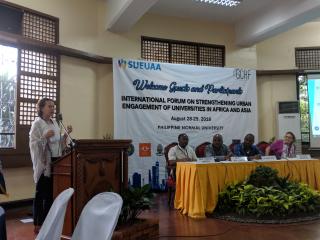One of the key elements of the Manila meeting was the knowledge exchange capacity of the meeting- particularly for the SUEUAA partners to highlight and discuss the issues facing their city, and also how their University is engaged in the Third Mission to seek to create solutions to these global challenges. The partners were split into two panels: University response to city issues ( African context), and University response to city issues ( Asian context).In the first session, Professor Charles Nherera (University of Zimbabwe, Zimbabwe), Dr Mpoki Mwaikokeysa, and Dr Heriel Moshi (University of Dar-es-Salaam, Tanzania), and Professor Elana Swanepoel (University of Johannesburg, South Africa) described the city specific issues affecting their local area.
Professor Nherera described the "paradox of poverty and underdevelopment in a 'resource rich' country" of Zimbabwe, highlighting the huge mineral resources, and investment in education but also the underdevelopment, poverty, hunger and corruption of the city. City wide issues included provision of water and sanittaion, issues surrounding refuse disposal, poor infrastructure, and youth unemployment. While he acknowledged that the Third Mission is not often prominent in academia (evidenced in absence in strategic and business plans and lack of presence in promotion criteria), he acknowledged that for solutions to be sustainable, they are required to have an interdisciplinary team that are able to think flexibly.
Drs Mwaikokesya and Moshi discussed the context of Tanzania, specifically, Dar-es-Salaam. Similar to Manila, Dar-es-Salaam also has issues with traffic congestion (an issue the group faced during our travels in the city), inadequate informal housing and high levels of waste. Given the high rate of traffic and industry, air pollution is a large issue, and for those living in informal settlements, they experience poor santitation, flooding risk, and poor access to services. They also discussed the main causes of adult mortality facing their area:HIV disease (affecting women more than men), injuries (men more than women), AFI including Malaria and TB. In terms of children 0-4 years, the main cause of mortality is malaria. In terms of University engagement with city issues, they described a range of activities, from developing entrepreneurial skills workshops for young people to address youth unemployment, meeting with Government groups to discuss climate change and disaster management- however from the point of view of the city, this was inadequate, citing that the University mainly engaged in consultations or informal activities. The presentation ended with a goal for universities moving forward: Universities and cities need to realise the need to change their traditional practices and formalise their engagement role.
Professor Swanepoel described a range of issues affecting the city, ranging from air pollution in city caused by factories not complying with regulations, flash flooding caused by global warming, high levels of social inequality (unemployment, drug and crime rates increasing, crime), educational inequalities, and state corruption. In the presentation, she also compared the perspectives of city officials and University academics on a range of issues. There was often agreement in the core issues of the city, although some differences in the solutions- that can be summarised by one quote from a University participant:
There is a complete disconnect between reality and intention at the moment in our country. Maybe its always been like that but I find its exacerbated at the moment.
If you are interested in learning more about their presentations, please access the attached powerpoint presentations below.

